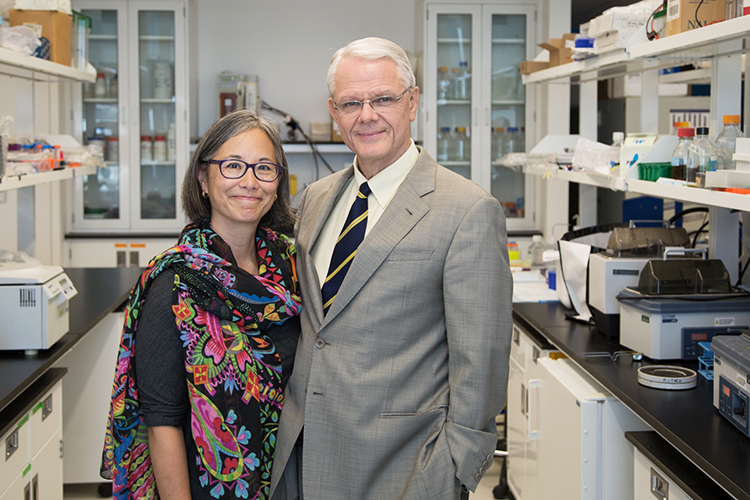Investing in the future of surgeon scientists
Jim and Mari Rutka collaborate with SickKids Foundation and the University of Toronto to fund opportunities for surgery residents, through the world-renowned U of T Surgeon Scientist Training Program.
Posted on October 26, 2016
A surgeon needs strong technical skills, first and foremost. But that’s not enough.
“We’re treating surgical conditions and diseases that we don’t have all the answers for yet — cancers that evade our best efforts at surgery, and organs that fail and require regeneration or replacement,” says James Rutka, chair of the U of T Department of Surgery and a neurosurgeon at the Hospital for Sick Children. “We need to untangle the complexity of these diseases through research, and use new insights to advance clinical care.”
U of T’s unique program has led to major surgical advances
At the forefront of this effort is the Faculty of Medicine’s world-renowned Surgeon Scientist Training Program (SSTP) — a unique program that enables all surgical residents at U of T to pursue research at the master’s or PhD level, in addition to their surgical training.
Launched in 1985 by leading surgeon and then-Department Chair Professor Emeritus Bernard Langer, the SSTP was the first of its kind, and remains one of the best surgical training programs in the world. It has led to major advances in procedures, and trained many of today’s top surgeon scientists. It was here that Professor Shaf Keshavjee began his work in the hugely successful ex-vivo lung transplantation. It was here — and in Rutka’s own research lab — that Professor Peter Dirks began investigations that ultimately led to his uncovering the role stem cells play in human brain cancers. He is now advancing this work as lead researcher of the $11.7 million Stand Up To Cancer initiative.
“Some of my greatest pride is having trained surgeons who have far surpassed me,” says Rutka, who is also Director of the Arthur and Sonia Labatt Brain Tumour Research Centre, where he continues to oversee SSTP trainees. In addition to Dirks, his former trainees include Professors Michael Taylor, Todd Mainprize, and Paul Kongkham, all of whom have made key discoveries leading to more targeted therapies for brain cancers. Rutka’s own research into the molecular pathways involved in malignant tumor growth and invasion is informing the development of potential new treatments.
Ensuring research funding for decades to come
As department chair and a surgeon-scientist himself, Rutka is deeply committed to the SSTP. Now he is building on this commitment as a philanthropist. Through a joint commitment from the Rutka family, SickKids Foundation, and the University of Toronto, the James and Mari Rutka Surgeon Scientist Training Fund will be established in the Department of Surgery. It will invest $3 million in the program, helping ensure it remains open to all surgical trainees and continues to enhance health care into the future.
“As a family, we really wanted to invest in this program and we know it will reap huge benefits for decades to come,” says Rutka. “It’s becoming very difficult now for investigators to obtain research funding. Accordingly, we rely on philanthropy more than ever to keep us at the cutting edge, and to maintain us as world leaders in scientific research.”
“As we face cuts to research funding, the Surgeon Scientist Training Program is one of those programs that is just too important to lose,” says Faculty of Medicine Dean Trevor Young.
“As a clinician scientist, I know how valuable this research training is in improving the care we offer. Not only has Jim been a leading surgeon scientist — combining his career as a neurosurgeon at SickKids with studying the dynamics involved in the most challenging diseases — he has also been a valuable academic leader. And now he and Mari are investing in the future of surgery as philanthropists — what a profound and tangible commitment of support.”
This investment in the future is key for the Rutkas. “People get so tied up in the present,” says Mari Rutka. “But if we want to truly leave a legacy, we have to start building the future now.”
By Carolyn Morris

